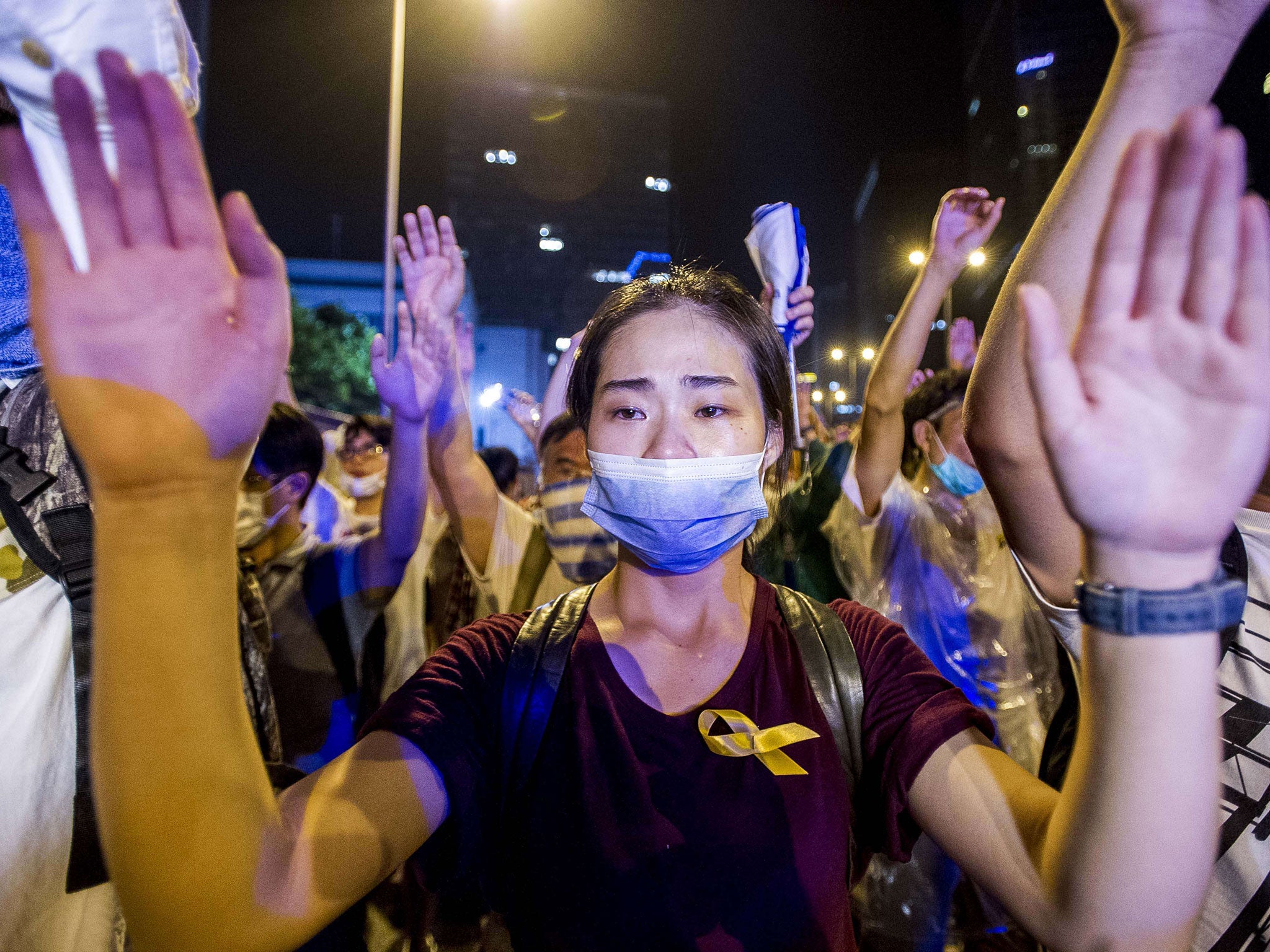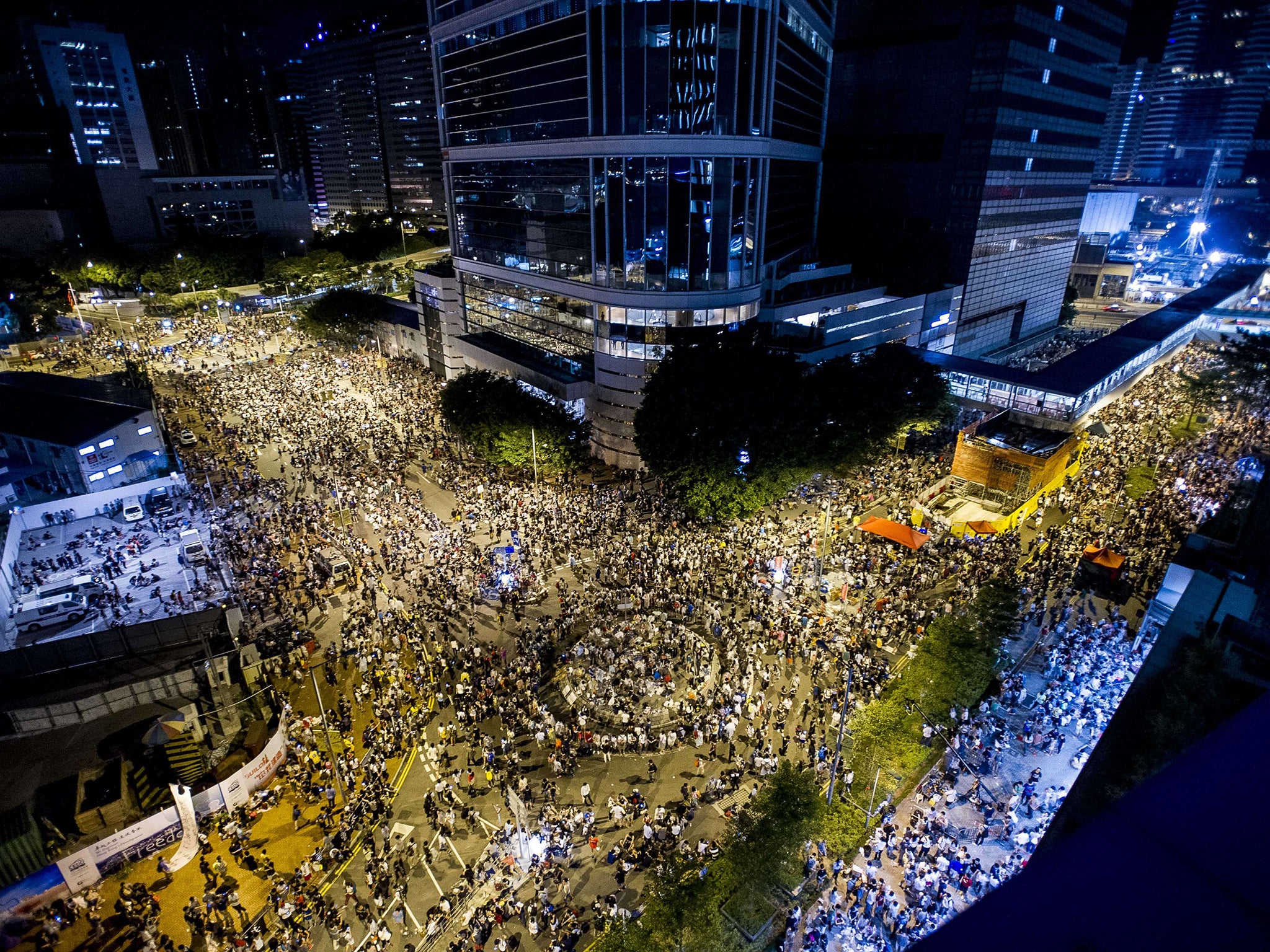Hong Kong protests: Why Beijing should be very worried indeed
Just because other democracy movements have failed doesn’t mean this one will


Your support helps us to tell the story
From reproductive rights to climate change to Big Tech, The Independent is on the ground when the story is developing. Whether it's investigating the financials of Elon Musk's pro-Trump PAC or producing our latest documentary, 'The A Word', which shines a light on the American women fighting for reproductive rights, we know how important it is to parse out the facts from the messaging.
At such a critical moment in US history, we need reporters on the ground. Your donation allows us to keep sending journalists to speak to both sides of the story.
The Independent is trusted by Americans across the entire political spectrum. And unlike many other quality news outlets, we choose not to lock Americans out of our reporting and analysis with paywalls. We believe quality journalism should be available to everyone, paid for by those who can afford it.
Your support makes all the difference.We could all be forgiven for looking at the scenes being played out in Hong Kong and gazing skyward in faint boredom. Have we not, in the space of just five years, watched similar crowd movements in so many of the world’s major cities?
There was the so-called Green revolution in Tehran after contested elections; Tahrir Square in Cairo, which became the symbol of the misnamed, as we now see it, Arab Spring. There was Tunis, there was Bahrain, there was Tripoli and Benghazi. There was Taksim Square in Istanbul, and two popular uprisings in Kiev – the Orange revolution and most recently Euro-maidan.
How many more times are we going to be called upon to lend our admiration and sympathy to an assembly that may or may not become a fully-fledged revolution? How much more vicarious passion do we have in reserve to support those prepared to lay down their lives for a way of life and a set of principles that many Westerners take for granted and have certainly never had to fight for? If you are bored, or more likely, just exhausted by the spectacle, I would urge you to fix on your electronic screen one more time.
Yesterday was the third day of mass street protests in Hong Kong. The demonstrators – a combination of students and the Occupy movement – managed to immobilise one of the world’s leading financial centres. This was an eventuality barely imagined when the protest began last week. It was widely assumed that people would disperse in time for the working week or, if they did not, that the Chinese authorities would use force, rather than countenance what actually happened: a popular protest bringing China’s equivalent of the City of London to a halt. Even from halfway around the world, you could sense the mix of euphoria, determination and danger that fuelled the protesters’ calculations.
What do they want? Specifically, they want Beijing to lift the restrictions it has imposed on who may stand for election in the territory in 2017. More generally, they want pretty much what all the other protesters – from Tehran to Kiev – have said they wanted over the years: democracy and the rule of law. Where this movement is different, however, is that, but for a decision taken by Margaret Thatcher, this Hong Kong generation might already be living in a democracy.
It was Thatcher – though it would probably have been any other British prime minister - who accepted that Hong Kong should revert to China in 1997 on the expiry of Britain’s lease. As a decision of law, it was defensible. In morality, though, it left much to be desired. The judicial argument was that if the UK did not observe the letter of the law, it could not call on others – in this case, China – to do so either. It is true that Hong Kong in those days was far from democratic, but as was frequently argued at the time, there is a difference between the UK’s largely benign overlordship and rule by communist China.

I used to visit Hong Kong in those years, and the leading lights of the democracy movement then are, remarkably, some of the same people as now. The redoubtable duo, Martin Lee and Anson Chan, were in London a few weeks ago, trying to persuade the UK government to show a bit more backbone vis a vis China. They left disappointed; any clout Britain might have had with Beijing as arrangements for the end of the lease were negotiated in the mid-80s (which was not much) is now even less, and London seems even less inclined to use it.
To give the 1980s negotiators their due, the British tried to bequeathe Hong Kong an administrative system that ensured that the territory would not simply be absorbed into China. “One country two systems” was the formula devised, along with electoral complexities that would tax the most legalistic of minds. Gradually, though, the safeguards have been eroded, even as China appeared to recognise that it could not destroy Hong Kong’s relative freedom without killing the goose of international commerce that lays its golden egg.
It is fair to say that the democracy movement of the 1980s was largely intellectual. The protesters of today appear to be cut from different cloth. They came equipped for the siege and tear gas that might meet them. There is a practical determination that did not exist before. Some of the difference can be accounted for by technology, social media and general awareness of the outside world. But maybe there is something else as well.
It is more than 25 years now since I switched on the television in my hotel room in Hong Kong to learn that China’s rulers had sent tanks into Beijing’s Tiananmen Square. The news, and the pictures, shocked the world, but they terrified Hong Kong, which was already committed to returning to Chinese rule. That afternoon, hundreds of thousands of Hong Kongers, individually and in families, dressed in white and proceeded through the streets in a vast, silent, expression of protest.
It is a new generation that is now on the streets, but a generation that has grown up with the memory of those days, experienced as children or recounted by their parents. This is why this movement is worth watching and why, even if it fizzles out, it will be seen by Beijing as a harbinger of destabilisation that could spread. Thus far, China has placated the Mainland with ever-rising living standards. There could come a time, not just in Hong Kong, where comparative prosperity is no longer enough.
Join our commenting forum
Join thought-provoking conversations, follow other Independent readers and see their replies
Comments